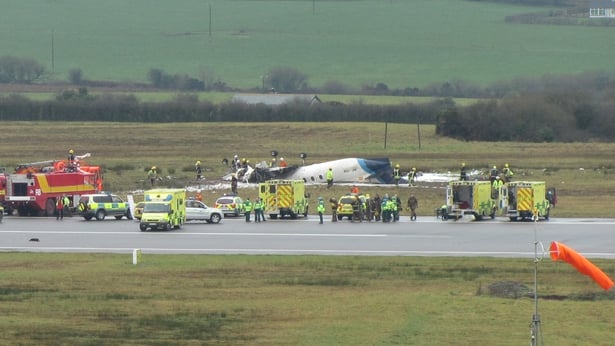An investigation into a plane crash in Cork in which six people died has found that Spain's aviation regulator contributed to the crash through inadequate oversight of the Spanish company which operated the fatal flight.
The final report, published today, of the investigation into Ireland's worst aviation crash in almost 50 years also found deficiencies on the part of the operating company, Flightline.
The Manx2 flight from Belfast to Cork crashed in dense fog at Cork Airport in February, 2011.
The flight's captain, co-pilot and four passengers died; six other passengers survived.
A preliminary report and two interim statements from the Department of Transport's Air Accident Investigation Unit told how bad decisions by the crew led directly to the crash.
Today's report states the crew did not give adequate consideration to the weather conditions in Cork; breached minimum weather standards during each of three attempts to land the plane; and the captain performed a manoeuvre reversing engine thrust which is prohibited in flight.
The report found that both the captain and the co-pilot had insufficient rest prior to commencing duty on the day of the accident, and were likely to have been suffering from tiredness and fatigue at the time of the accident.
The captain of the flight, 31-year old Jordi Sola Lopez from Barcelona, had only been promoted four days prior to the crash.
His co-pilot, Andrew Cantle from Sunderland in England, only joined the airline three weeks before the crash.
The report finds their pairing together on the flight was "inappropriate".
Today's final report also examines the complex relationship between the Spanish company which owned the Metroliner plane, Air Lada, the operator, Flightline, and the ticket seller, Manx2.com.
It describes as inadequate Flightline's supervision of the service as well as the oversight of Flightline by Spanish aviation regulator AESA. It says both of these were a contributory cause of the crash.

The report says the flight captain was inadequately trained in the command role, and was ill-prepared for the situation he found himself in on the day of the accident.
The co-pilot's training was not completed; some of Fleetline's operational responsibilities were being inappropriately exercised by Air Lada and Manx2.com.
In relation to AESA, the report says there was no oversight of Flightline's service in Ireland and that AESA said it was "unaware" that Flightline was operating in Ireland, in spite of having regulatory responsibility for the company.
The report recommends that AESA reviews its policy regarding oversight of the carriers for which it has regulatory responsibility, particularly those conducting "remote" operations in other countries.
The report addresses four of its 11 safety regulations to the European Commission directorate responsible for commercial air transport. It is believed to be the first time an air accident investigating team has done this.
The report was sent to the six survivors and to the families of those who died over a week ago.
Its findings will be closely examined, not least by the legal teams pursuing law suits on their behalf.
Solicitor calls for action
Meanwhile, the solicitor representing the majority of the survivors and two of those who died in the crash has said it is critical that the findings are followed up and delivered on.
James Healy-Pratt, partner with aviation law specialists, Stewarts Law, told RTÉ’s News At One that these recommendations are a critical part of the report.
He said the families have praised the AAIU for their comprehensive report and that its findings reveal a low-safety, low-cost airline operation.
Mr Healy Pratt said it shows there were systemic failures from a regulation perspective but also from a flight operations perspective.
No comments:
Post a Comment